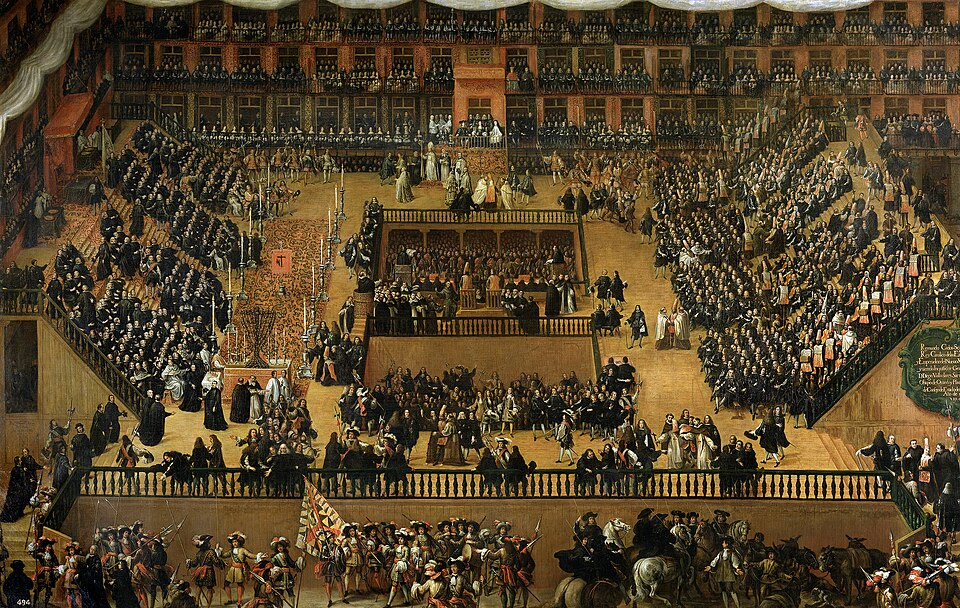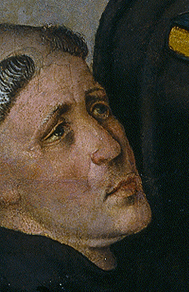IB Syllabus focus:
'• The inception, development, and execution of the Spanish Inquisition.
• Case studies of persecution, forced conversions, and expulsions.
• The long-term effects of religious persecution on Spanish society and culture.'
The Spanish Inquisition, one of the most notorious chapters in the annals of religious persecution, remains an enduring symbol of the dangers of intolerance and the unchecked confluence of religious and political power.
Inception, Development, and Execution of the Spanish Inquisition
Inception
1478: Papal Bull issued by Pope Sixtus IV sanctioned King Ferdinand and Queen Isabella to establish a church-based Inquisition in Spain.
Rationale: Root out heresy, with a primary focus on the conversos — Jewish individuals who had converted to Christianity. The concern was these individuals secretly practised their original faith.
Development
1480: Seville saw the initiation of the first official Auto da Fé (Act of Faith). This ceremonial event involved the public presentation, humiliation, and sometimes execution of alleged heretics.

An auto-da-fé in Madrid’s Plaza Mayor shows the ceremony’s staged choreography: the royal tribune, Dominican preachers, and prisoners wearing sambenitos and conical corozas as sentences are read. Although painted in 1683, it captures the public ritual central to the Inquisition’s enforcement methods across Spain. Note that the specific event shown (Madrid, 1680) post-dates the Seville precedent but illustrates the same practices. Source
1483: Tomás de Torquemada, a Dominican friar, assumed the position of Inquisitor General. Under his guidance, the Inquisition expanded its reach and intensified its methods.

Portrait traditionally identified as Tomás de Torquemada, the Dominican friar appointed Grand Inquisitor in 1483, who organized tribunals across Castile and Aragon. As a central architect of the Inquisition’s expansion, his image anchors discussion of institutional leadership and policy. Source
Expansion: The tentacles of the Inquisition spread from Seville to other parts of Spain. Cities such as Córdoba, Jaén, and Valladolid became hubs for Inquisitorial activities.
Execution
Methods of Investigation: The Inquisition used torture, threats, and prolonged imprisonment to extract confessions.
Punishments: Included public burnings (burning at the stake), confiscation of property, public penance, and imprisonment.
Scope: While the initial focus was primarily Jews, over time, the Inquisition’s net widened to encompass Muslims, Protestants, and other religious minorities.
Duration: Although it began in the late 15th century, the Inquisition continued in various forms and intensities until its formal cessation in 1834.
Case Studies of Persecution, Forced Conversions, and Expulsions
Conversos and Moriscos
Conversos: Many Jews converted to Christianity, sometimes voluntarily and sometimes due to intense pressure. Despite their conversion, they remained under constant suspicion of secretly adhering to Jewish customs and beliefs.
Moriscos: Similar to the conversos, Moriscos were former Muslims who had converted to Christianity but were doubted for their religious sincerity.
Ostracism: Both these groups were frequently marginalised, viewed with distrust, and were common targets during the various Inquisition trials.
Expulsion of the Jews, 1492
Edict of Expulsion: Under this decree, Jews in Spain were given the harsh choice – convert to Christianity or leave Spanish territories.
Effects:
Approximately 200,000 Jews were forced to abandon Spain.
Most sought refuge in nearby territories: North Africa, the Ottoman Empire, and various parts of Europe.
Persecution of Protestant Reformation Supporters
As the Protestant Reformation gained momentum in Europe in the 16th century, Spain, remaining a Catholic stronghold, grew increasingly wary of its influence.
Those suspected of sympathising with Protestant tenets or possessing Protestant literature were apprehended, tried, and often executed.
Notable Trials
Bartolomé Carranza: The Archbishop of Toledo, despite his high religious standing, found himself entangled in the Inquisition’s web. After nearly 17 years of imprisonment and trial, he was released but died shortly after.
Luís de León: A respected scholar and professor at the University of Salamanca, de León was arrested for translating the Song of Songs directly from Hebrew. He faced nearly five years of incarceration before being exonerated.
Long-term Effects of Religious Persecution on Spanish Society and Culture
Social Impact
Erosion of Diversity: The systematic expulsion of Jews and Muslims led to a significant dilution of Spain's once diverse and rich cultural fabric.
Economic Decline: Many of those persecuted and expelled were skilled craftsmen, merchants, and professionals. Their forced exodus deprived Spain of invaluable skills and expertise, hampering its economic progress.
Cultural Impact
Literary Censorship: The Inquisition introduced the Index Librorum Prohibitorum, a list of prohibited books. This not only curtailed intellectual freedom but also isolated Spain from the blossoming Renaissance in Europe.
Homogenised Religious Identity: Spain’s once diverse religious tapestry was gradually replaced by a monolithic Catholic identity, which became deeply ingrained in its cultural ethos.
Educational Impact
Academic Stagnation: As the rest of Europe basked in the glow of the Renaissance and Enlightenment, Spain’s rigorous religious orthodoxy hindered academic and scientific advancements. The country became relatively insular in terms of intellectual pursuits.
Political Impact
Power Centralisation: The monarchy, in close alliance with the church, wielded the Inquisition as a potent tool to consolidate and centralise power. This confluence of church and state played a pivotal role in shaping Spain’s political trajectory during this period.
The Spanish Inquisition, in its bid to establish religious homogeneity, ended up leaving an indelible mark on the socio-cultural and political landscape of Spain. The lessons gleaned from this epoch are a testament to the importance of religious tolerance and the perils of conflating religious dogma with political might.
FAQ
Art and literature, both during and post the Inquisition era, offer insightful reflections on this tumultuous period. While direct criticisms during the Inquisition's peak were rare due to fear of reprisal, subtle critiques and reflections emerged in artistic representations. Paintings often captured the solemnity, drama, and at times, the brutality of Auto da Fé ceremonies. Later, as the Inquisition's influence waned, more overt critiques surfaced. The Spanish Romantic writer Gustavo Adolfo Bécquer, for instance, touched upon the themes of the Inquisition in some of his works. Literature and art, thus, became mediums to document, reflect, and at times challenge the Inquisition's narrative.
Yes, there were individuals who voiced their opposition to the methods and practices of the Inquisition. One notable example is the Spanish humanist and scholar, Juan Luis Vives. He criticised the methods of the Inquisition, particularly the use of torture to extract confessions. Internationally, criticisms came from figures like Erasmus of Rotterdam, who disapproved of the Inquisition's brutal tactics. Even Pope Sixtus IV, who had initially approved the Inquisition, expressed concerns about its excessive methods. However, given the immense power and influence of the Inquisition, open criticisms within Spain were rare and came with considerable personal risk.
The Spanish Inquisition impacted Spain's relations with other European states in several ways. Firstly, it underscored Spain's staunch commitment to Catholicism during the Reformation, distinguishing it from other nations that were increasingly tolerant of Protestantism. This led to political and religious tensions, especially with Protestant-majority nations. Secondly, the expulsion of Jews from Spain resulted in a diaspora, with many Jews seeking refuge in the Ottoman Empire, North Africa, and other parts of Europe. The reception and protection offered to these refugees affected diplomatic relations. Additionally, the Inquisition's brutal reputation and stories of persecution often shaped the perception of Spain in foreign courts and among the European populace, at times, casting the nation in a negative light.
While the concept of an inquisition was not unique to Spain, the Spanish Inquisition distinguished itself in scope, intensity, and its connection to the monarchy. Earlier European inquisitions, like those in France against the Cathars, were episodic and relatively localised. In contrast, the Spanish Inquisition was a sustained, centralised effort that spanned centuries. Additionally, while other inquisitions operated under direct church control, the Spanish Inquisition was firmly under the Spanish monarchy's thumb, allowing for a synthesis of religious and political objectives. This combination made it particularly potent and, at times, more severe than its European counterparts.
Pope Sixtus IV played an instrumental role in the inception of the Spanish Inquisition. In 1478, he issued a Papal Bull granting King Ferdinand and Queen Isabella the authority to establish a church-based Inquisition in Spain. The primary objective was to investigate and suppress heresy, particularly focusing on the conversos. However, it's worth noting that Sixtus IV later expressed reservations about the excesses of the Inquisition and its methods, suggesting that the monarchs might have taken the authority beyond what he had originally intended. Yet, by this point, the Inquisition had become a potent tool in the hands of the Spanish monarchy.
Practice Questions
The Spanish Inquisition, established to consolidate Catholicism and suppress heretical views, achieved significant success in imposing religious conformity in Spain. Its relentless pursuit led to the conversion, expulsion, or execution of numerous Jews, Muslims, and perceived heretics. Consequently, Spain witnessed an erosion of its rich religious diversity, replaced by an overarching Catholic identity. However, this 'achievement' came at a great cost. While the Inquisition bolstered religious uniformity, it stifled intellectual progress, isolated Spain from European Renaissance ideals, and created deep societal divisions. In terms of strict religious conformity, it was largely successful, but its broader ramifications were multifaceted and profound.
The Spanish Inquisition had profound repercussions on Spain’s cultural and economic landscape. Culturally, the Inquisition's stringent censorship, exemplified by the Index Librorum Prohibitorum, curtailed intellectual freedoms, causing Spain to lag in the Renaissance and Enlightenment movements sweeping Europe. The once vibrant interplay of Jewish, Christian, and Islamic cultures, which had enriched Spain's cultural tapestry, was supplanted by a homogenous Catholic identity. Economically, the persecution and expulsion of Jews and Muslims, many of whom were skilled professionals, resulted in a substantial brain drain. This, combined with Spain's relative isolation from Europe's burgeoning trade networks, induced economic stagnation. The Inquisition, thus, shaped Spain's trajectory in ways that went far beyond mere religious considerations.

